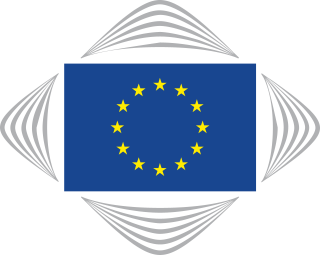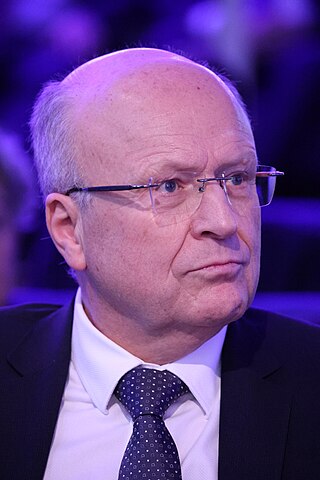
The European Court of Justice (ECJ), formally just the Court of Justice, is the supreme court of the European Union in matters of European Union law. As a part of the Court of Justice of the European Union, it is tasked with interpreting EU law and ensuring its uniform application across all EU member states under Article 263 of the Treaty of the Functioning of the European Union (TFEU).

The General Court, informally known as the European General Court (EGC), is a constituent court of the Court of Justice of the European Union. It hears actions taken against the institutions of the European Union by individuals and member states, although certain matters are reserved for the European Court of Justice. Decisions of the General Court can be appealed to the Court of Justice, but only on a point of law. Prior to the coming into force of the Lisbon Treaty on 1 December 2009, it was known as the Court of First Instance.

The European Committee of the Regions (CoR) is the European Union's (EU) assembly of local and regional representatives that provides sub-national authorities with a direct voice within the EU's institutional framework.

The Constitutional Court of Hungary is a special court of Hungary, making judicial review of the acts of the Parliament of Hungary. The official seat of the Constitutional Court is Budapest. Until 2012 the seat was Esztergom.

The institutions of the European Union are the seven principal decision-making bodies of the European Union and the Euratom governed under the Treaties of the European Union and European Union law. They are, as listed in Article 13 of the Treaty on European Union:

Janusz Czesław Wojciechowski is a Polish politician and was a long-standing Member of the European Parliament, elected from the Lodz Voivodship representing the Polish People's Party (PSL) (2004–2006), the Polish People's Party "Piast" (2006–2010) and, lately, Law and Justice. In 2016, he left the parliament to become a member of the Court of Auditors. Since 2019 he has been the European Commissioner for Agriculture.
Melchior H. M. J. F. C. Wathelet is a Belgian politician and member of the Humanist Democratic Centre who served as 4th Minister-President of Wallonia. He has degrees in law and in economics and is a Master of Laws. He is also a professor at the Catholic University of Louvain and the Université de Liège. From 1995 to 2003 he was a Judge at the European Court of Justice. Following that, Wathelet served as Secretary of State for Asylum and Migration. In 2012-2018, Wathelet served as Advocate-General at the Court of Justice.

Koen Lenaerts, Baron Lenaerts is a Belgian jurist and the President of the Court of Justice of the European Union. He is also a Professor of European Law at the Katholieke Universiteit Leuven and was a member of the Coudenberg group, a Belgian federalist think tank.

A jabot is a decorative clothing-accessory consisting of lace or other fabric falling from the throat, suspended from or attached to a neckband or collar, or simply pinned at the throat. Its current form evolved from the frilling or ruffles decorating the front of a shirt in the 19th century.
Rosario Silva de Lapuerta is a Spanish jurist who served as a judge at the European Court of Justice (CJEU) between 7 October 2003 and 7 October 2021 and since 9 October 2018 as a Vice-President of the CJEU.

The Court of Justice of the European Union (CJEU) is the judicial branch of the European Union (EU). Seated in the Kirchberg quarter of Luxembourg City, Luxembourg, this EU institution consists of two separate courts: the Court of Justice and the General Court. From 2005 to 2016, it also contained the Civil Service Tribunal. It has a sui generis court system, meaning 'of its own kind', and is a supranational institution.

The Federal Constitutional Court is the supreme constitutional court for the Federal Republic of Germany, established by the constitution or Basic Law of Germany. Since its inception with the beginning of the post-World War II republic, the court has been located in the city of Karlsruhe, which is also the seat of the Federal Court of Justice.

Katarina Barley is a German politician and lawyer who has been a Member of the European Parliament since 2019, serving as one of its Vice-Presidents. She served as Federal Minister of Justice and Consumer Protection in the fourth Cabinet of Angela Merkel. Prior to that, she had served as Federal Minister of Family Affairs, Senior Citizens, Women and Youth and since 28 September 2017 also as the acting Federal Minister of Labour and Social Affairs, both until 14 March 2018.

Gerard William Augustine Hogan, is an Irish judge, lawyer and academic who has served as a Judge of the Supreme Court of Ireland since October 2021. He previously served as Advocate General of the European Court of Justice from 2018 to 2021, a Judge of the Court of Appeal from 2014 to 2018 and a Judge of the High Court from 2010 to 2014. Hogan first worked as a barrister and lecturer in law specialising in constitutional and administrative law.

The ninth European Parliament was elected during the 2019 elections and sat until the Tenth European Parliament was sworn in on 16 July 2024.

Patrick Breyer is a German digital rights activist, jurist, Pirate Party Germany politician, and – since 2019 – Member of the European Parliament (MEP). From 2012 to 2017 he was a member of the state parliament of Schleswig-Holstein and from April 2016 until the end of the legislative period he was also the leader of the Pirate group in that assembly. Breyer is one of four European Pirate Party MEPs in the 2019–2024 term along with three Czech Pirate Party members, all of whom are members of the Greens / EFA parliamentary group.
The Polish constitutional crisis, also known as the Polish rule-of-law crisis, is a political conflict ongoing since 2015 in which the Polish government has been accused of failing to comply with European and Polish constitutional law. The 2015 elections resulted in the Law and Justice party winning control of both the presidency and the parliament. With this government trifecta, PiS used its power to appoint judges to the Constitutional Tribunal in 2015, leading to the 2015 Polish Constitutional Court crisis. The government of Poland continued to expand its hold on the judiciary resulting in the 2017 Supreme Court crisis, and the 2019 Polish judicial disciplinary panel law. These events allowed the legislature and executive of the Polish government to have de facto control over judges and their appointments.
Anthony Michael Collins is an Irish lawyer who is an Advocate General of the European Court of Justice. He previously served as was Judge of the General Court of the European Union from 2013 and 2021.

The Palais de la Cour de Justice is a building complex acting as the seat of the Court of Justice of the European Union (CJEU), located in the European district of the Luxembourg City quarter of Kirchberg. Today the Palais complex encompasses the original 1973 building, now known as the Ancien Palais, which houses the court rooms of the CJEU's Court of Justice, the Anneau building, encircling the Ancien Palais, which contains the judges chambers and deliberative rooms, the three tower buildings containing the CJEU's translation services, and the Gallery building, containing the CJEU's legal library and linking all the structures of the Palais complex with the renovated three annexes originally constructed between 1978 and 1994 that now host the court rooms of the CJEU's General Court.
Slovenia has been a member of the European Union since 2004.













